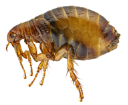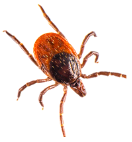Fleas and Ticks
Let’s have a close look at the dangers of flea/tick infestation. Fleas and ticks cause problems not only for our pets, but for us humans as well.
| Fleas
Fleas are capable of jumping distances more than 100 times their body length to attach themselves to their host. They begin to lay eggs on their host 24-48 hours later and reach adulthood soon after. The period fleas require to mature depends on the season, but during the summer, it only takes 12-14 days. During spring/autumn, a little longer, approximately 3-4 weeks. So are we safe from them during the winter? The parasites’ life cycle is activated in environments as cold as 13℃, so no, winter is not the “safe” period. If anything, fleas thrive in winter as well, especially indoors as households tend to be heated to comfortable temperatures. Even cats that are 100% indoor cats are at risk for infestation. Fleas cause problems such as allergic dermatitis, which is caused by the host’s allergic reaction to their saliva. They also transmit tapeworm, an intestinal parasite. If you discover little white objects that resemble rice grains on your pet’s anus or on their bed, beware! Skin rashes caused by fleas can also be an issue for pet owners. |
| Ticks
An adult tick lays 2000-3000 eggs at a time. Hatchlings repeat the process of sucking blood from its host and shedding to reach adulthood in approximately 1 month. An adult tick on a full tummy can grow to about 100 times its initial weight before it starts to lay eggs. Ticks tend to be hiding in the bushes, so beware when taking your pet to the park or to other grassy areas. Ticks transmit Babesiosis, a hematologic disease caused by a parasite that attaches itself to the host’s red blood cells. Symptoms include anemia, fever, and loss of appetite, and if acute or severe, may even cause death. People are at risk too. SFTS (Severe Fever with Thrombocytopenia Syndrome) is caused by a virus that ticks carry. Mortality rate is high, and 1 in 5 people are known to succumb to the disease. |
☆ Flea/ tick prevention can be accomplished with spot-on or oral preventives (Frontline, MyfleaGuard, Nexguard) administered monthly. Bravecto, administered only once every 3 months, is also available.




